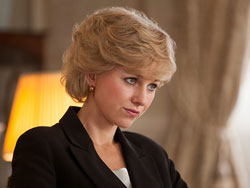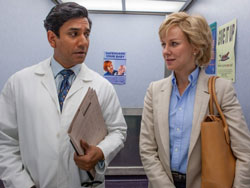A consummate portrait of loneliness

One of the most endearing aspects of the film is that in her performance of Diana, Naomi Watts never attempts to impersonate the iconic princess and celebrity, but delivers an astounding real performance of a woman imprisoned by fame and robbed of love.
Directed by Oliver Hirschbiegel, who gave us a powerful portrait of Hitler during the last days of the Fuhrer's life in Downfall, Diana is a consummate masterwork that skilfully draws us into the world of a woman who triumphantly conquers her isolation and loneliness and sets out on a quest to become a major international campaigner and humanitarian.
What's great about recent films based on true-life celebrities, like the superb Behind the Candelabra with Michael Douglas as Liberace, Helen Mirren with her commanding performance as Queen Elizabeth II in The Queen and The Audience, Colin Firth in The King's Speech, Bill Murray in Hyde Park on Hudson, Anthony Perkins immersing himself in Hitchcock, and Ashton Kutcher with his great Jobs, it's that the filmmakers can take us where no one can ever go, and where angels fear to tread.
Beans on toast

Who could ever walk with a barefoot Diana into her kitchen and stand with her while she is making her beans on toast? Diana perfectly captures the normality of icons that are placed on pedestals and seem to not have a private and intimate life. The film further succeeds in poignantly showing us two sides of a woman who might not have had control over her fateful destiny, but who had full command over hungry paparazzi bloodhounds, but was totally lost when she fell in love with her soulmate, Dr Hasnat Khan, a British Pakistani heart surgeon.
Naveen Andrews, best known for his roles in The English Patient and the hit television series Lost, is magnificent as a man who falls in love with the woman of a dreams, a dangerous object of affection that is unfathomable.
The heart of Diana is the rite of passage of Diana from a slightly depressed, lonely lady to somebody who found fulfilment in her personal life, which extrapolated into her professional life; it charts how finding true personal happiness allowed Diana to achieve her defining successes.
A sincere and heartfelt story

Diana is not a sensationalistic docu-drama about Diana, but a sincere and heartfelt story of a woman who wanted to make the most of life, despite the odds. It is sometimes not easy to understand what really happens behind scandalous news headlines or vicious gossip, but with Diana we are given a rare and dignified opportunity of looking into the heart and soul of a woman.
Hirschbiegel deftly captures our imagination and full attention with a dramatic opening scene that takes place on the tragic night of 30 August, 1997, as Diana left the Ritz Hotel in Paris along with her boyfriend Dodi Al Fayed. Before leaving the hotel, Diana is in the bathroom of her hotel trying to phone Khan, and when she gets his voicemail, she leaves the room with Dodi. We closely follow her and her entourage down the passageway when she suddenly stops. Everything goes silent and Hirschbiegel pulls his camera back to the door of the hotel room, with Diana stopping dead in her tracks, waiting to hear if the phone rings ....
This suspense is carried throughout the film as Diana is trapped in a war zone and becomes a target bombarded by many obstacles. If you are looking for a film that delivers on all aspects and ultimately results in a love story that trumps Romeo and Juliet, make sure to see Diana. It's a film you cannot miss for the simple reason that it captures the sum total of a frenzy and obsession no one will ever fully understand. What it also does successfully is show how important it is to respect people who sometimes become objects of our affection, and never to intrude on the lives of a life we do not understand or are not living. It shows that love is possible, if we really want it with all our being.
Note: Although it seems impossible, ensure to know as little or nothing about Diana, Princess of Wales before watching the film.
Behind the scenes
One of the international playwright and screenwriter Stephen Jeffreys' key points of references when writing the screenplay was a meeting he had with Diana, when she awarded him a prize at the Evening Standard Drama Awards at the Royal Court. "I realised from talking to her that the standard press portrayal of her as a brainless bimbo was utterly wrong: she was quick, witty and intelligent. That five-minute conversation was my lodestar as I wrote the film: I returned to the voice I'd heard when imagining what she would say."
Writing a script based on real people and events, and, in particular, writing about one of the most famous people in the world was something Jeffreys found challenging. "The crucial events of any such films are the moments to which there were no witnesses, the private scenes, usually between two people where no one actually knows what happened. In these scenes I had to take off and fly using empathy and imagination. This was the hardest part." In researching the screenplay, Jeffreys read an abundance of books and articles on related topics. Of these, the most important was Diana: Her Last Love, by Kate Snell who became a consultant on the film. Jeffreys also read Sarah Bradford's Diana, "which gives by far the best account of the formation of Diana's character," he said. Meeting Oonagh Shalney-Toffolo, one of Diana's healers, was also a great privilege for the writer providing valuable insight into the spiritual aspects of Diana's character. "Finally having lunch with David Puttnam in the House of Lords was very significant: he knew Diana well and told me I caught her character accurately."
Read more at www.writingstudio.co.za/page1037.html


